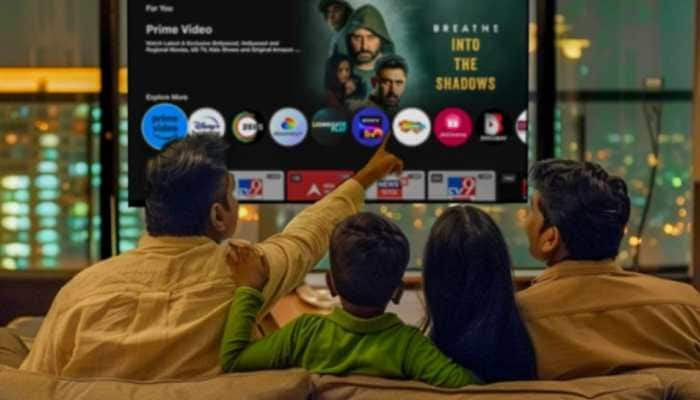Social distancing impossible during a squash match: Saurav Ghosal
Ace Indian squash player and 7-time Asian Games medalist, Saurav Ghosal, in an exclusive interview with WION's Sports Editor, Digvijay Singh Deo, opened up on life in lockdown, challenges squash a sport will face post-lockdown, international squash calendar, financial struggles of squash players, future of sports with travel restrictions in place and much more.
Trending Photos
) Image Credits: Twitter/@SouravGhosal
Image Credits: Twitter/@SouravGhosal Ace Indian squash player and 7-time Asian Games medalist, Saurav Ghosal, in an exclusive interview with WION's Sports Editor, Digvijay Singh Deo, opened up on life in lockdown, challenges squash a sport will face post-lockdown, international squash calendar, financial struggles of squash players, future of sports with travel restrictions in place and much more.
Digvijay Singh Deo: Good to see you, Saurav. Now the only time a super-active player like you would be locked inside would be a nasty injury but nothing of that sort, so, is boredom your biggest enemy these days?
Saurav Ghosal: It's a difficult time for everyone. It feels strange being away from the squash court for so long, it has been more than nine weeks now and I have never spent that much time away from the game. I usually take about three weeks off in the summer, but i always know when I'll be back in action, so there's a light at the end of the tunnel. Whereas now we have no idea when things will open up and there is so much uncertainty in terms of the sporting calendar. I'm not sure if boredom is my biggest enemy, the bigger challenge is to accept the current situation and dealing with the anxiety of not knowing what will happen in the immediate future. I'm trying to keep a positive mindset and just trying to keep the clock ticking on a daily basis. Fortunately, I have gotten into a routine over the last few weeks and funnily enough, I now feel that there aren't enough hours in the day to do all the things that I want. I'm in a good space right now and hopefully, I can keep it like this till I return to the squash court.
DSD: You, in fact, made an extremely wise decision of flying back to India from London just after Holi. Was it a conscious decision to do so with the numbers rising globally from the pandemic back then...
Saurav Ghosal: I returned to India on the 13th of March. I was in London for the Canary Wharf Classic, unfortunately I lost in the quarter-finals on the 11th of March. I remember that day the Indian government had issued a travel advisory for various European countries and I felt like the situation was only going to get worse. I didn't want to end up being in a situation where I was stranded away from home and didn't have a place to stay. Luckily my travel agent was able to arrange a flight back to India on the 12th and I'm glad I made that decision to come back. Since then, things have gone into a downward spiral and there are so many people in the world who are struggling.
DSD: But lucky not to serve home quarantine. Our badminton team returning from the All England had to serve 21 day period of self-isolation.
Saurav Ghosal: At the time I came back from London, those travelling from the UK were not required to quarantine for two weeks upon returning. However, since I came back, I think I have only been outdoors once to go to the squash club. So it's not very different from what the badminton team experienced. I think it is the duty of every citizen of the country to be responsible in these times of crisis. We have to follow the government's guidelines if we want to return to normalcy or something that resembles a normal life.
DSD: So what's the routine like? I have seen you play at the Asian Games over the years and I can say that squash is an absolutely brutal sport when it comes to fitness levels so how are you managing?
Saurav Ghosal: It is difficult to plan your training schedule because we don't know when tournaments will resume. However, it is important to maintain some level of fitness and I think any physical activity also helps with mental health as well. I try to work on my physical fitness for about two hours every day. Fortunately, I have a lawn in my apartment complex, so I do some running there. I don't have much gym equipment, so that has forced me to get creative in my workout. It is important to keep the body and mind active at this point because I'm not getting the 'release' of playing on the squash court. Some people really enjoy going to the gym, but I am not one of those.
For me, playing squash is what is the end goal, that is what drives me. I look at working out as something that enables me to play the game of squash. My physical trainer and I are trying to come with a weekly plan for training, but it is very difficult to replicate the movement on the squash court. I think in terms of training in quarantine, no one really has the right answer because this is an unprecedented crisis, everyone is employing the trial and error method. Once I get back on the squash court, it definitely will take some time for me to return to my peak fitness level, but I have to do the best with the resources that are currently available to me. Training is hard but it is satisfying to get an intense physical work out under the belt.
DSD: Have you been managing any basic kind of squash.perhaps just dribbling against the wall to keep you in touch with the fundamentals of the game.
Saurav Ghosal: There is a big wall next to the parking lot in my apartment complex and I hit a few balls there, once in 2-3 days. But it's strange to do that in an isolated environment because you don't have the reference point of the side or back walls, which is very important. It is helpful to at least work on my swing a little bit. I was speaking to the women's world number one, Raneem El Welily, the other day and she reckons that she will be a completely different player after this lockdown because of the lack of practice. She is one of the most talented players the world has ever seen and even she is worried about her skill levels dropping. For her to say something like that just shows you how difficult it is for an athlete to cope with a situation like this. I believe the priority for athletes is to maintain their mental health, it is important to not get pulled in to that dark hole of depression and anxiety.
DSD: What are the challenges you foresee when all this ends? The international squash calendar at the moment is suspended till July and your area of work is a confined glass court.
Saurav Ghosal: There can be some minor modifications, but the fundamentals of the sport cannot change. Social distancing will be impossible to practice in squash because of the lack of space on the court. Like badminton and tennis. Squash tournaments are held all over the world, so international travel has to resume for events to be held. There are health risks as well and players will have to be tested regularly before and during tournaments. I don't think we will reach a point in the near future when all the health risks can be eliminated. I think it is a question of minimising the risk as much as possible and work towards creating a safe environment for events to be held. It is a tough balancing act because there are many livelihoods at stake, but at the same time, we cannot take any action that increases the risk of the coronavirus spreading. I think these decisions have to be made after careful considerations and must not be made in haste.
DSD: And is that where Indian squash will struggle? With international events uncertain, do we have a strong domestic structure to keep people like you competitive?
Saurav Ghosal: There is no doubt that there are some talented players on the Indian circuit like Harinder Sandhu, Mahesh Mangaonkar and Ramit Tandon. But the level of competition is not the same as it would be against the top-20 players in the world. If there are some domestic tournaments before the international calendar begins, I would use it as an opportunity to get back in the groove and experiment on some aspects of my game. My goal is to do well and win events at the world stage, if those events don't take place, then the motivation levels are also not as high. For a limited period of time, the Indian federation can look into holding some tournaments so that the players get some action. However, for an extended period of time, it doesn't serve a major purpose for an athlete like me.
DSD: Squash also faces the same problems as professional sportspersons worldwide like tennis and golf when it comes to earnings. With tournaments not on, players and the ecosystem are not earning money and also the purse isn't as big as the cheques in tennis and golf.
Saurav Ghosal: A lot of livelihoods are dependent on the game of squash. The money might not be as much as tennis or golf, but many people need squash to fulfil their basic needs. If the game doesn't return in the near future, we might see people moving away from the sport. I think squash players will be able to survive financially till the end of the year, but in the new year it will be necessary for the sport to return, otherwise, the whole ecosystem of the sport will be in major trouble. We might even see players looking at other avenues for their financial well being. It is not just squash or sport in general, every industry has been hit by the coronavirus. There is only a certain period of time when an organisation can bank on their reserves for survival, any industry or ecosystem needs to be up and running after a period of time to be able to sustain those who are dependent on it for their livelihoods.
DSD: Saurav, when it comes to prize money, do you think players will risk the health and fly all over the globe and serve quarantine to play each time.
Saurav Ghosal: It's definitely possible. I think it's a very personal decision for every athlete to make. There are a number of squash players who will be willing to take some risk in order to be able to earn some money because it is what they make a living on. It is a unique scenario and I don't think anyone should be judged on a decision that they make. Each person has to weigh the pros and cons of taking part in a particular event and then make a decision that is best for them. I think the PSA World Tour will only start once there are minimal health risks involved. I hope that the risks are mitigated to a great extent so that I feel comfortable travelling, communicating and playing. Hopefully, we'll soon be in a position when we don't have to think too much about these decisions.
DSD: What kind of leadership are you expecting from your world body. Some countries are starting to open up. Would it be better to club tournament into a country so that players fly-in, serve quarantine where required, play two or three weeks and then fly home…
Saurav Ghosal: When we're talking about holding events, the discussion is only about the big tournaments for the top players. But there are also many other tournaments for the lower-ranked players that will have to be organised and that will be a major challenge. The big tournaments are able to attract sponsorship and broadcasting rights. The PSA should look at addressing the problems of the lower-ranked players by planning some of the smaller events. The top players in the world are well-off and have enough financial savings to tide over this period of crisis. I think the federation should look at holding area-wise tournaments s for lower-ranked players, that means only players of certain countries will be able to participate in the championships. That will mean a drop in the number of player entries but it is a compromise we have to make at this time. Like I said before there is no wrong and right decisions at the time, but as long as the intent of these decisions is to look after the players and their safety, then the players will be on board.
DSD: For you personally Saurav, has this period been one of self-introspection or perhaps some new learning.you are also at that stage of your career when you can sit back and think of resetting targets...
Saurav Ghosal: We don't often get the opportunity to reflect and take stock of our lives and careers when we are on tour. Since we're either practising, travelling or recovering from an injury. I've been a professional for a very long time, but there are so many things that I have learnt about myself in the last two months. I am trying to incorporate that into my routine and hopefully, it will help me in the future. In terms of my career, every year during the off-season, I analyse my physical and mental state and it is only then that I make a decision to continue, after recharging my batteries, with fresh goals in mind. That downtime during the offseason has helped my refocus and re-energise, and I don't see any reason to change that. I feel physically and mentally fit and there is a lot more that I want to achieve in my career.
I am currently world number 13 and I also got into the top 10 for a while last year, but this is not when I want my career to end. Eventually, I want to be world number one and everything that I do right now is with that goal in mind. 2022 is a big year for me with the Asian Games and the Commonwealth Games. Even though I really want to play both those events, I will only take a final decision when I take stock again next summer. I don't want to look too far ahead and make a premature decision. Of course, those events are at the back of my mind, but those are not the only goals that I have. You have to be able to enjoy the process as much as anything. Sometimes when you have a long-term goal in mind, you tend to get distracted and then your performances suffer. It is important to keep a high level of focus and concentration in every match you play. Every point and detail counts and if I'm thinking about an event which is two years away, then I won't be able to give my 100%.
DSD: Being a global traveller that you are, what is the message we all need to take on board through this period of crisis. Viswanathan Anand believes we should show some restraint but just seeing the queues for the opening of liquor shops here means the race and the crowds will be back the moment this lockdown ends.
Saurav Ghosal: I think those of us who are fortunate to have a roof over our head and food on the table, should be grateful for all that we have. There are so many who do not have access to basic essentials in normal times, but this coronavirus crisis has in a way highlighted their strife. All of us have problems in some form of the other and how you deal with it is a matter of perception. I think you will always find a way to deal with these problems if you do not allow it to amount to a massive burden on your head. The best way to do that is to have gratitude to all the small things that you have. We need to realise that other people are desperate for certain things that we have and we should cherish these privileges. Everything is relative and once we look at things from that perspective, then automatically we will be more grateful. That, in turn, will bring more balance and calm in our lives. This is an internal process and is a journey rather than a goal in itself. I feel you need to go through tough times to be able to really cherish the joyful moments in life. Most people are saying that they are very lucky to be able to spend time with their respective families during the lockdown. Once the rat race begins, they will obviously not be able to do so, but even taking out a little bit of time for your loved ones in a day will go a long way in creating a positive ecosystem in the world. So hopefully people will have more gratitude once we overcome this crisis.
Stay informed on all the latest news, real-time breaking news updates, and follow all the important headlines in india news and world News on Zee News.
Live Tv







)
)
)
)
)
)
)
)
)
)
